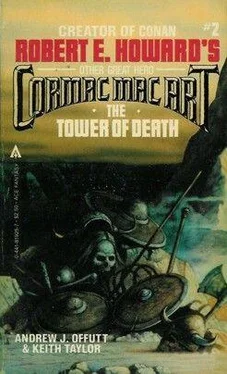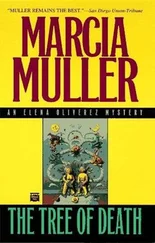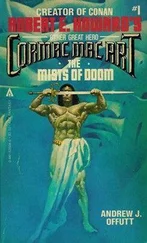Andrew Offutt - The Tower of Death
Здесь есть возможность читать онлайн «Andrew Offutt - The Tower of Death» весь текст электронной книги совершенно бесплатно (целиком полную версию без сокращений). В некоторых случаях можно слушать аудио, скачать через торрент в формате fb2 и присутствует краткое содержание. Жанр: Фэнтези, на английском языке. Описание произведения, (предисловие) а так же отзывы посетителей доступны на портале библиотеки ЛибКат.
- Название:The Tower of Death
- Автор:
- Жанр:
- Год:неизвестен
- ISBN:нет данных
- Рейтинг книги:3 / 5. Голосов: 1
-
Избранное:Добавить в избранное
- Отзывы:
-
Ваша оценка:
- 60
- 1
- 2
- 3
- 4
- 5
The Tower of Death: краткое содержание, описание и аннотация
Предлагаем к чтению аннотацию, описание, краткое содержание или предисловие (зависит от того, что написал сам автор книги «The Tower of Death»). Если вы не нашли необходимую информацию о книге — напишите в комментариях, мы постараемся отыскать её.
The Tower of Death — читать онлайн бесплатно полную книгу (весь текст) целиком
Ниже представлен текст книги, разбитый по страницам. Система сохранения места последней прочитанной страницы, позволяет с удобством читать онлайн бесплатно книгу «The Tower of Death», без необходимости каждый раз заново искать на чём Вы остановились. Поставьте закладку, и сможете в любой момент перейти на страницу, на которой закончили чтение.
Интервал:
Закладка:
Little cause had she to feel hurt. He’d made her safe, assuming Raven survived.
The weather remained foul and the wind continued to veer wildly and shriek like the Ban-Sidhe or Banshee of Cormac’s own homeland. Men broke their backs rowing and bailing, and snatched what rest they might between turns. Ordlaf Skel’s son manned the steering-oar until he was nigh dropping, and Wulfhere relieved him then, to stand braced like the Colossus of that southern isle called Rhodes.
Again and again the wind shifted direction and tried to creep up behind them like a hungering hyena, or blow Raven onto her side.
A howling squawl hit them like a hammer of Thor. It tossed the ship about as if she’d been a chip in rapids, and none slept while that lasted. Had Raven turned broadside-on to those maniacal seas, she must have capsized in a moment-as she almost did in any case.
Minutes of high excitement became hours of anguish.
After midnight, they enjoyed a spell of clear weather. Men sagged and breathed through open mouths while with dull eyes they stared at wet boards.
Cormac, passing the mast on his way to rest, was put in mind of Clodia. Hours had passed. He paused to free the sodden bundle with stringing hair gone dark with wet and frost-flecked with brine. The knots binding her to the mast were soaked stiff and salty, hard as lumpy iron nodules out of a cold forge. Annoyance that had driven another man to shrug and forget it made the Gael persist, while a sailor’s respect for good cord kept him from simply cutting it. His tough fingers opened the knots at last.
Clodia virtually fell away from her support.
“Thank you, Cormac,” she gasped, and she meant it. Conviction had come on her that, left there longer, her limbs had begun to rot off. A like thought had occurred to Cormac. Yet necessity was on them to raise sail, and Clodia had been in the way.
“Cormac…”
His face remained impassive despite the piteous appeal of her voice and face. “Ye live, Clodia. And it’s not as my guest ye be aboard.” And he went from her.
By scanning the stars through wind-shredded gaps in cloud, and by Behl the sun as he shook off the dark and reigned anew, they discovered that they were far off course. Now Clodia of Nantes knew the reason that men of the sea ever equivocated with words such as should and with luck and good fortune when they answered the simple question: “How long will it take?” For none could ever be sure. A journey by sea might take two days or ten-or three months, an a ship, was blown so far off her course and then afflicted with calm.
Erelong, those aboard Raven had contrary winds to fight again. These rose to such a patch that not sail only, but mast as well had to be lowered, else both had gone by the board. The wind shrieked like mad hags babbling inanities and lightning lit the sky with lurid flashes, followed by the crash of thunder.
Thor was angry.
Aegir was awake, and angry.
Ran was angry. And what care had the son of Lir for a girl of Nantes, and boys and men of Dane-mark, and one long exile from Eirrin?
It went on that way for five days.
Save for two other such respites that were all too brief, their time on the Bay of Treachery was consistently as bad as the first day, or worse.
They were fighting a sea that deserved all its fell repute, that hated humans and drowned whales while tearing down cliffs. Its bottom must be crowded with ships and bones, assuming that many had been foolish enough to come abroad here. A lesser ship than Raven and her crew had not been seen again save as fragments of axhoned wood torn by wind, and sodden corpses washed up on far beaches. With weaker leaders, even that crew might have given up from weariness and let themselves rest-in the nets of Ran.
Two of the wounded men died.
Two others, able-bodied companions, were lost in the hell of the sea for a moment’s missed footing; in truth, Ubbi was gone because he’d released his grip on his oar long enough to pick his nose.
Four deaths, and they received no comment aside from muttered oaths and a fare-thee-well. There was not even time to think good thoughts of those men. The Danes could mourn their comrades later, so long as they did not join them. And so long as former comrades returned not as liches; Those Who Walk after Death.
During one of the respites, idly talking men decided that Aegir and Ran had naught to do with this awful stretch of water, and the skalds must merely have failed to make mention that here reigned Loki and his ugly get, Hela who ruled the underworld. Clodia was willing to think them right, as she had already decided they were the coldest, meanest, bravest and most competent men under heaven.
On the fifth day the winds steadied, and fell.
Raven rocked gently on the water become glassy plain, and weary survivors of wrathful, treacherous winds basked in the gentleness as in sweet bed-linen. Men sagged, or merely crumpled and slept, or rose and stretched-and then slumped. Up went the sail, and it was hardly less relaxed than the men beneath.
In twilight, they espied a dark coastline. After the cloudy sundown a land-breeze roved out to bring the welcome scents of earth and forest. Yet was too soon to rejoice; as leaders, the Gael and the huge Dane had to decide what landfall might portend. Nor was thinking easy for them, with fatigue on their bodies and brains like thrice-filtered poison.
They spoke with great deliberation and exaggerated care and what, in fresher state, they’d have deemed thick simplicity, the Gael in particular.
“Yon be Hispania,” Wulfhere said. “Must be.”
“Hispania,” Cormac agreed. “And the northern part. Most likely the north-west. Galicia. That is the name they call it by. Galicia.” He paused to ponder, and that ponderously. “Have we enemies here?”
“I think not. Ye’ll not believe me, Wolf, but this is one coast where I’ve never done business. Farther south, aye. Never here.”
“Nor I.”
“Strange.”
“Umm.” Cormac was bethinking him of former days, when he’d led a band of Eirrin’s reivers and men had named him the greatest such sea-wolf since Niall of the Nine Hostages.
Aye, Cormac an-Cliuin had plundered farther south than this too, all the way to Africa’s sparkling shores and within the very blue, blue Mediterranean. Yet it chanced that he had never put in at Galician shores, not even for naught so harmless as to lift a few cattle for fresh eating. He’d taken nary a drop of Galician booty off a ship, to his knowledge. There could be naught against him here, in this northwest corner of Hispania… save his reputation, o’course, should he chance to meet with narrow, finicking men.
He raked through his tired memory for what he knew of this land.
The people here were an insular lot, he seemed to recall, not the sort to care what he and Wulfhere had done in other places, to other peoples. The Galicians were just as separated from other men as the sea-roving tigers of Raven . Some German tribe held the mastery here, didn’t it? Aye-what was it they were called, now. An amalgam of tribes, an old group united in-
“Sueves!” the Gael said aloud.
“Slaves?”
“Na, redbeard: Sueves. The Suevi. The people who rule this land.” He slapped his knee, on which the watered, salted leather had gone dry and hard as old bark. “Fine, then! They’ll not be hanging us unless on principle, and-”
“Principle?” Wulfhere’s tone was truculent.
“We are pirates, Wulf! We can make ourselves understood by them. It’s a German people they are, or were. I had their king’s name, once.”
“Ah! One Veremund the Tall. That his height is what a Dane would reckon ‘tall’ I misdoubt, though. Umm… the name’s all I know of him.”
Читать дальшеИнтервал:
Закладка:
Похожие книги на «The Tower of Death»
Представляем Вашему вниманию похожие книги на «The Tower of Death» списком для выбора. Мы отобрали схожую по названию и смыслу литературу в надежде предоставить читателям больше вариантов отыскать новые, интересные, ещё непрочитанные произведения.
Обсуждение, отзывы о книге «The Tower of Death» и просто собственные мнения читателей. Оставьте ваши комментарии, напишите, что Вы думаете о произведении, его смысле или главных героях. Укажите что конкретно понравилось, а что нет, и почему Вы так считаете.












